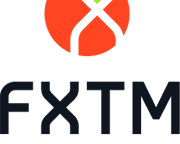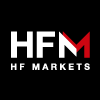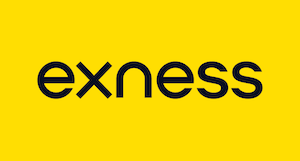Despite its emerging market status, Kenya has a relatively strong regulatory regime when it comes to online retail Forex CFD trading. Unlike many of its peers, Kenya laid out a legal framework for local regulation in 2017 – and placed the traditional financial regulator, the Capital Markets Authority (CMA), in charge of enforcement.
As a result, Forex brokers with a physical presence in Kenya are required to hold a licence from the CMA and adhere to strict regulations, similar to those seen in Europe and the United Kingdom. For Kenyan Forex traders the most important measures taken are:
- Operating Capital Requirements: CMA licenced Forex brokers must maintain an operating balance of at least 50 million KSH, plus 5% of liabilities owed to clients.
- Capital Reserve: In addition, they must also retain a reserve of 40 million KSH (or 80% of their operating capital, whichever is higher) in cash or cash equivalent.
- Leverage Restriction: Much like the European and British regulatory regimes, the CMA requires all Kenyan brokers to restrict leverage, in this case to a maximum of 1:20 for non-finance professionals.
These regulations are important because they protect traders – operating and reserve capital requirements ensure that in the case of the broker bankruptcy traders can still claim their funds back, and leverage restrictions ensure that beginners traders don’t lose all their money while they are still learning.
The regulatory functions of the CMA as provided by the Capital Markets Act include; licensing and supervising all the capital market intermediaries; ensuring compliance with the legal and regulatory framework by all market participants; regulating public offers of securities, such as equities and bonds & the issuance of other capital market products such as collective investment schemes; promoting market development through research on new products and services; reviewing the legal framework to respond to market dynamics; promoting investor education and public awareness; and protecting investors’ interest.
Unfortunately, there are only three brokers currently regulated by the CMA and none of them have the trading conditions to match the international brokers offering their services in the country. But, by having a regime in place and brokers already licenced, Kenya is far ahead of many of its neighbours and we are optimistic that the Kenyan Forex industry is well-placed for secure and stable growth over the next few years.
It’s important to note that since 2017 a number of disreputable brokers and companies posing as Forex brokers have been operating in Kenya, so if you are going to work with a local broker it is essential that you investigate their regulatory status before opening an account.
According to the Capital Markets Act, section 23 (1),“No person shall carry on business as an online forex broker or hold himself out as carrying on such a business unless he holds a valid license issued under this Act or under the authority of this Act.”
Trading with Regulated Offshore Brokers in Kenya
As mentioned above, there are several scam brokers currently operating in Kenya, and the three CMA licenced brokers are greatly restricted in the trading conditions they can offer. The safest and most profitable way to trade Forex CFDs in Kenya is to trade with a well-regulated offshore broker.
Most of the larger international brokers are regulated by one of three trusted government authorities, the most trusted authorities in the world are:
It is crucial to choose a broker that is regulated by at least one of these authorities, and you will find that some are regulated by more than one. The FCA is seen as the most rigorous of these authorities, as they charge a much higher licencing fee and require brokers to have more operating capital than ASIC or CySEC.
All three of these regulators have much higher operating capital requirements than the Kenyan CMA and impose much stricter oversight and auditing of the brokers under their supervision, thereby ensuring a fair and secure trading environment.
Brokers with regulation from one of these authorities often have regulatory oversight from smaller, more lenient, regulators too. This allows them to offer a different range of products to overseas clients. For instance, the UK’s FCA requires that maximum leverage is set at 30:1, but an FCA-regulated broker with a subsidiary company regulated by the Mauritius Financial Services Commission (FSC) would be able to offer leverage of 400:1 to clients outside UK and Europe.
While regulators like the Mauritian FSC are not as well regarded as the FCA, ASIC or CySEC, most of the brokers we recommend for Kenyan traders are regulated by at least one of the major regulators alongside any more lenient authorities.
How we choose the best Forex Brokers in Kenya
Though most brokers might appear to be similar at first, they are quite different once you dig a little deeper. To make an effective comparison, our research team judges every Forex broker by the same standards. This makes it easier to spot the poor-quality brokers and makes it easier for you to compare them. The main areas we look at are:
- Regulation: Your funds will only be safe with properly licenced brokers
- Cost: What kind of fees you will be charged by a broker
- Trading Conditions: How a broker’s business model will affect your trading experience
- Customer Support: How well does a broker treat its clients who need help
- Trading Platforms: What kind and how many trading platforms does a broker offer
We also look at a few other things, but these are the most important to consider when choosing a Forex broker. We will go through each of these areas in more detail and then jump into a few FAQs.
If you have any questions after reading through this guide, please get in touch with us in the comments at the bottom of the page or via our contact page.
1. Regulation: How to Avoid Scam Brokers
The single most important aspect of judging a Forex broker. Regulation ensures the security of your funds and offers protection against fraud, broker manipulation and broker bankruptcy.
Simply put, having a regulated broker is not optional.
Some traders believe that unregulated brokers are rare, but sadly this is not the case. Unregulated brokers will often claim to be regulated, so you should always check what they say is true. We know that unregulated brokers like to contact people on Facebook and via messaging apps, so be especially careful if this happens.
Checking a broker’s regulatory status is a similar process for all the major regulators and only takes a couple minutes (and could save you a lot of money and heartache!)
In this section we will have a brief look at the most common regulators in the Forex industry and how to find out if a broker is regulated. Once you are finished reading this section you will be able to check if a broker is licenced with all the following regulators:
- The South African Financial Services Conduct Authority (FSCA)
- The Australian Securities and Investment Commission (ASIC)
- The UK’s Financial Conduct Authority (FCA)
- The Cyprus Securities and Exchange Commission (CySEC)
South African Financial Services Conduct Authority (FSCA)
The South African FSCA is well-regarded but is not considered one of the best African regulators. Kenyan traders like to trade with FSCA regulated brokers as this provides more local protection and requires the broker to have a local South African office and bank accounts.
Checking if a broker is regulated by the FSCA is easy. The FSCA offers a search tool for all authorised Financial Service Providers (FSPs) here: https://www.fsca.co.za/Fais/Search_FSP.htm.
This is what the search window looks like:
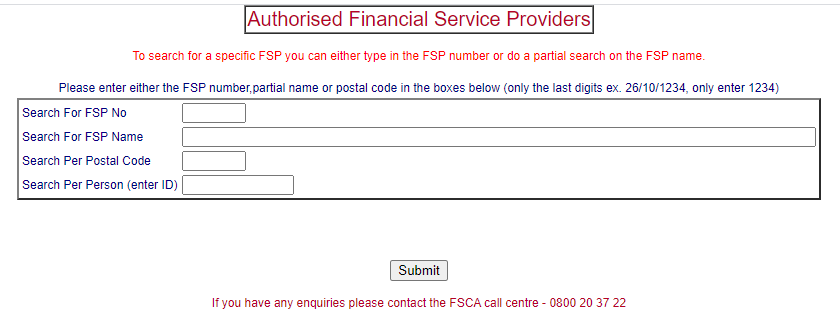
The best way to use this search function is to input the brokers FSP number, which they are legally required to display at on their website.
For instance, here is Khwezi Trade’s FSP notice and number at the bottom of its webpage:

You will notice that Khwezi Trade is not the name of the Financial Services Provider regulated by the FSCA, but is actually Khwezi Financial Services. This is quite common as brokers are often part of a larger financial company. It does mean that searching by broker name using the FSCA’s search tool can be quite tricky, so use the FSP number if you can.
Using this information from Khwezi Trade’s website we can then search the FSCA database. Here we can see that Khwezi Financial Services is indeed an authorised FSP:

We can also see that Khwezi Financial Services is approved to offer derivative instruments. This is important as all Forex CFD trading is derivative trading.
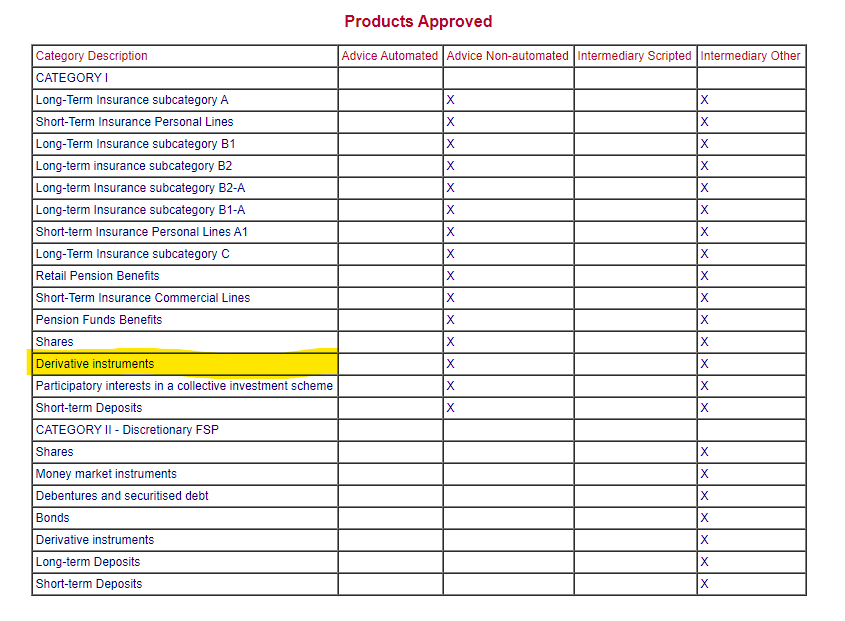
Australian Securities and Investment Commission (ASIC)
The Australian financial regulator has an excellent global reputation and is continually active in combatting broker fraud and manipulation. Many of the most respected Forex brokers in the world are Australian, and ASIC is an important part of their reputation for trustworthiness.
Checking a broker’s regulatory status with ASIC is a very similar process to the South African FSCA’s, the ASIC search tool can be found here: https://connectonline.asic.gov.au/.
Unfortunately, detailed information on each company in the ASIC database is only available via purchase. See below for Pepperstone’s ASIC entry:
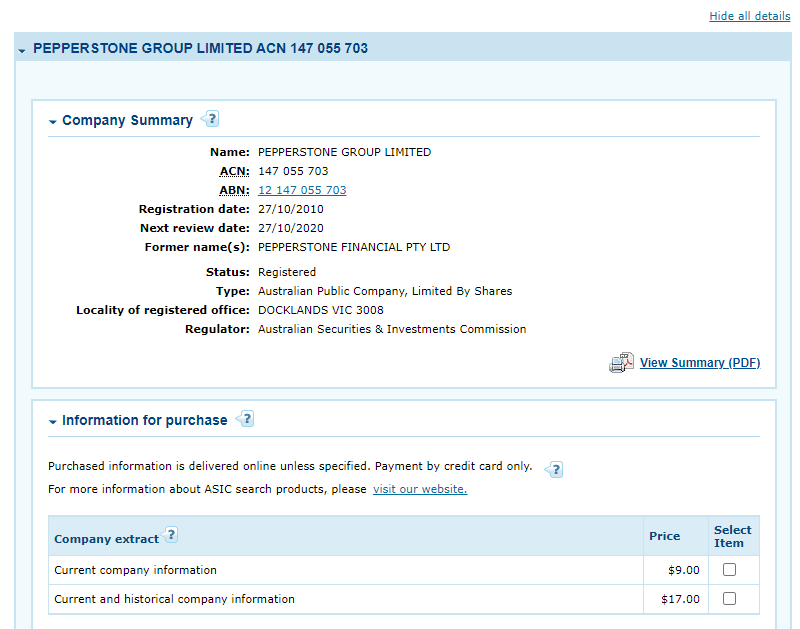
All ASIC regulated brokers are required to publish their ASIC licence on their homepage. We have had a few reports of unregulated brokers claiming to be based in Australia and using the names of regulated financial companies, so it is always best to check thoroughly.
UK Financial Conduct Authority (FCA)
The UK’s Financial Conduct Authority is seen as the best financial regulator in the world. It’s no surprise that their search function is the easiest to use and the most thorough, you can access it here: https://register.fca.org.uk/s/.
Like other major regulators, all brokers with an FCA licence are required to publish their FCA reference number on their website, here is AxiTrader’s FCA number at the bottom of their website:

Like Kwhezi Trade in South Africa, AxiTrader is the trading name of a larger financial group, in this case, the FCA licence holder is AxiCorp Limited. Using the FCA reference number, we can search the FCA’s database of registered companies and find AxiCorp Limited’s entry:
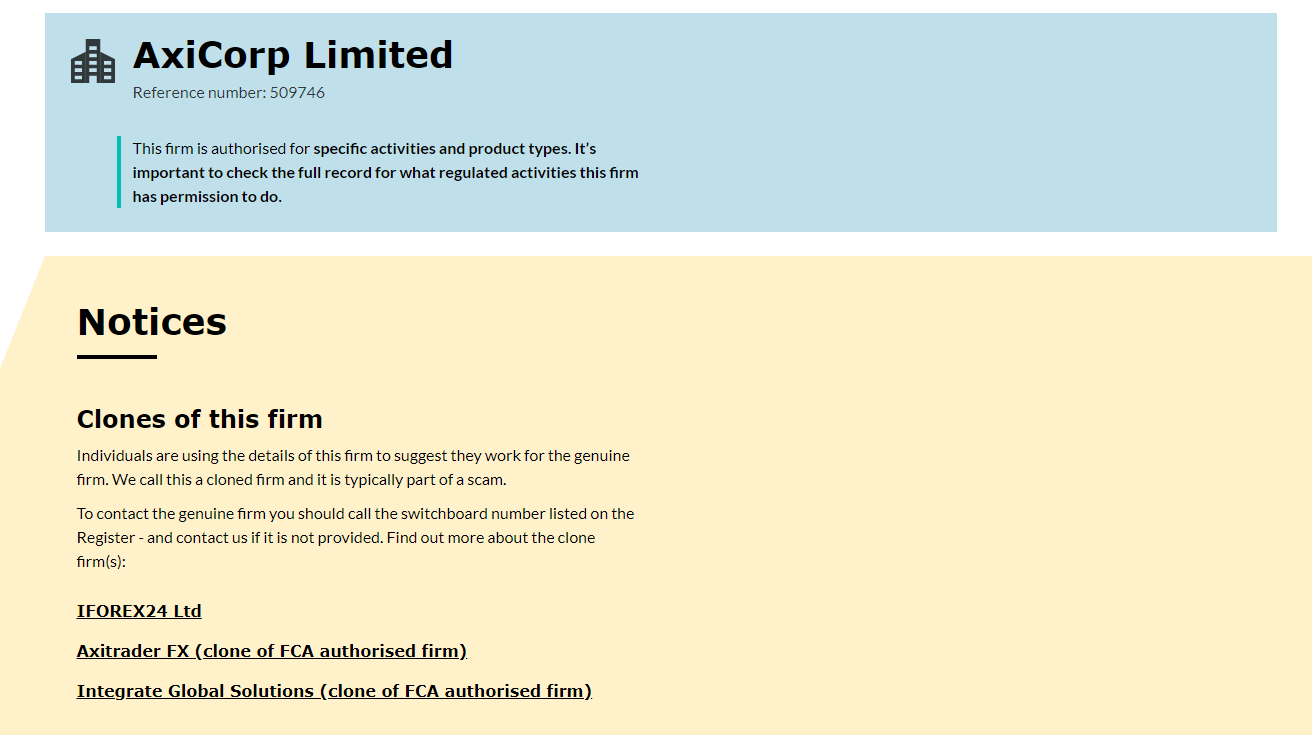
Notice that the FCA also warns of unregulated brokers that are attempting to use AxiCorp’s identity to scam unwary traders.
Cyprus Securities and Exchange Commission (CySEC)
CySEC is the foremost regulator in the EU and Cyprus has a long history of regulating online Forex brokers. As a European regulator, all brokers with a CySEC licence must abide by the EU’s MiFID II legislation. Among other things, this requires limits on leverage and the removal of trading bonuses.
CySEC’s broker search tool functions much like the FCA’s and all CySEC licenced brokers are required to publish their licence number on their website. CySEC’s database and search tool can be found here: https://www.cysec.gov.cy/en-GB/entities/investment-firms/cypriot/
Below, we can see the entry for AFX Capital Markets, which went bankrupt last year and is suspected of several wrongdoings, including using client money to cover operational costs.
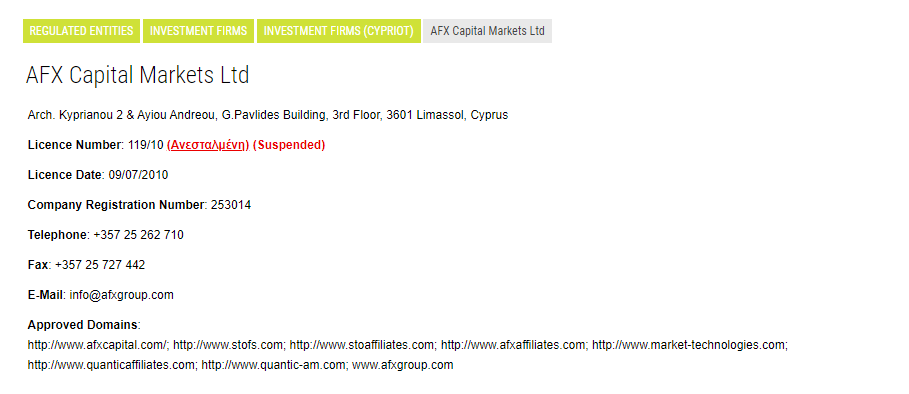
CySEC make it clear that AFX Capital Market’s licence has been suspended. A clear sign not to trust a broker.
Other Regulators
There are many other small regulators around the world, and Forex brokers will hold licences with them to avoid the restrictions placed on them by ASIC, CySEC and the FCA.
Commonly seen small regulators include the Seychelles FSA, the Mauritius FSC, the St Vincent and Grenadines FSA, the Belize IFSC and the Bahamas SCB. While being regulated by one of these smaller regulators does not mean that a broker is bad, it does mean that traders are not as well protected.
The best and most trustworthy brokers are regulated by at least one of the three major regulators (FCA, CySEC, ASIC). It is common for brokers to have multiple regulators, one for each region in which they operate. A good example of this is FXTM, below is a screenshot from the bottom of their website:
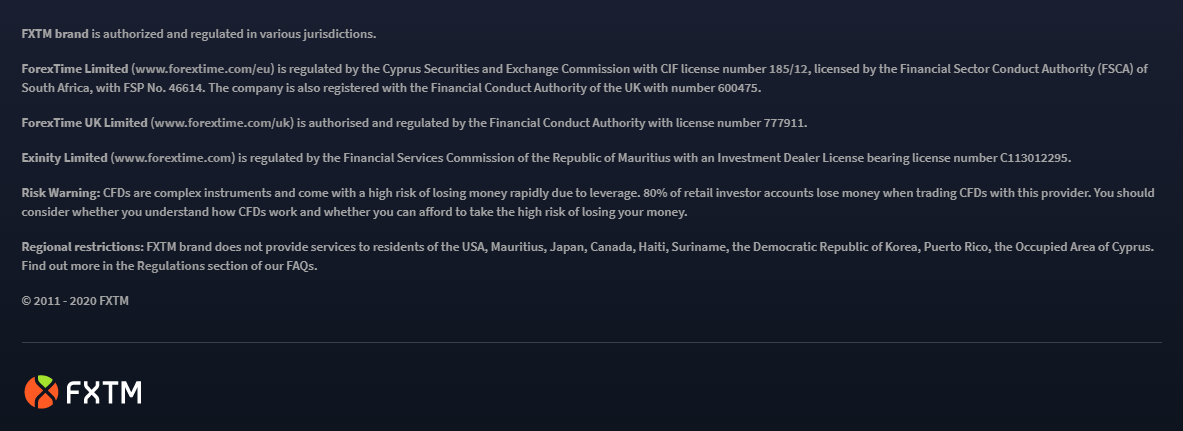
We can see that FXTM and its subsidiary companies are regulated by CySEC, the FSCA, the FCA and the Mauritius FSC. This allows FXTM to offer its services to traders all over the world.
IOSCO Investor Alerts Portal
There is one final tool which you might find useful. The International Organization of Securities Commission (IOSCO) maintains a list of every investor warning issued by every regulator in the world, and this is available here: https://www.iosco.org/investor_protection/?subsection=investor_alerts_portal
This list contains a huge number of entries so the easiest way to search is using the keyword option, see below:
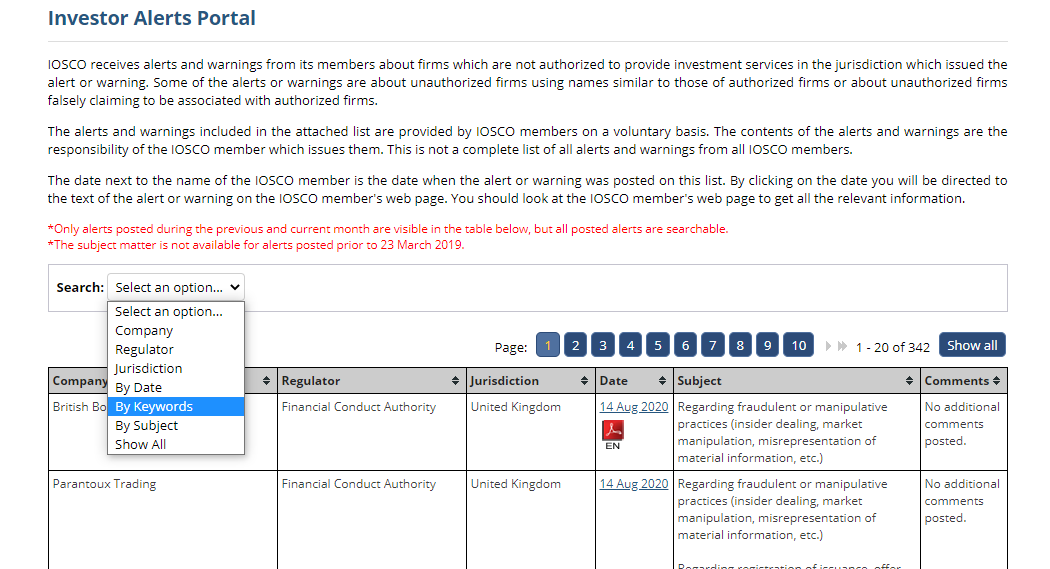
We recently had a question from a trader regarding a broker called RedfordFX, they had contacted him out of the blue and he was suspicious. So, let us run a search for this company using the IOSCO keyword tool.

As you can see, the CNMV (the Spanish financial regulator) released a warning about RedfordFX on August 3, 2020. Obviously, not a broker to trust!
If you are concerned about a broker for whatever reason, do check this database before you part with any funds.
2. How Much Does It Cost to Trade Forex?
Forex trading is famously low-cost, but Forex brokers still charge fees for their services. The most obvious fee is the spread (the difference between the buy and sell price) and some brokers also charge a commission per trade. But brokers also charge rollover fees, and some charge deposit and withdrawal fees. Finally, there is also the minimum deposit to consider.
To have a good idea how much it will cost you to trade with a broker you will need a clear understanding of these fees and how they will affect your profits.
The Spread
The spread is the difference between the buy and sell price of a currency pair and is measured in pips (the smallest amount by which a currency can change). The lower (or “tighter”) the spread, the less of your own money you will be spending when you trade.
All good brokers will publish their spreads for all the currency pairs they offer. A good example is AvaTrade’s product information sheet below:
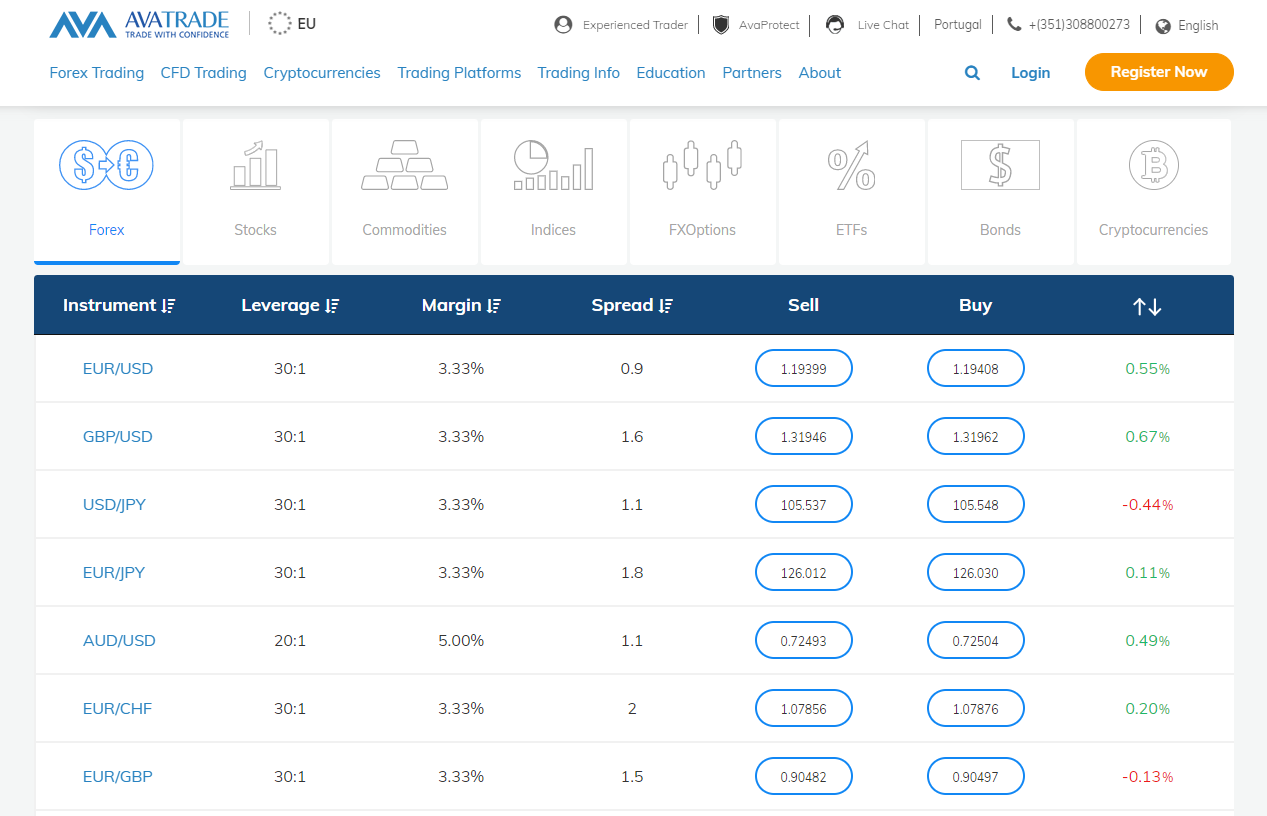
Here we can see that AvaTrade’s spread on the EUR/USD is 0.9 pips. Avatrade also publishes the exact buy and sell price for each currency pair as well as the daily change in the price of each currency pair. You will also see the leverage and margin listed, which we will discuss later.
Now that we know what AvaTrade’s spreads are, let us have a look at IG Markets’ spreads so we can compare the two.
IG Markets has floating spreads which means that they can get lower or higher (“tighter” or “wider”), depending on market movements.
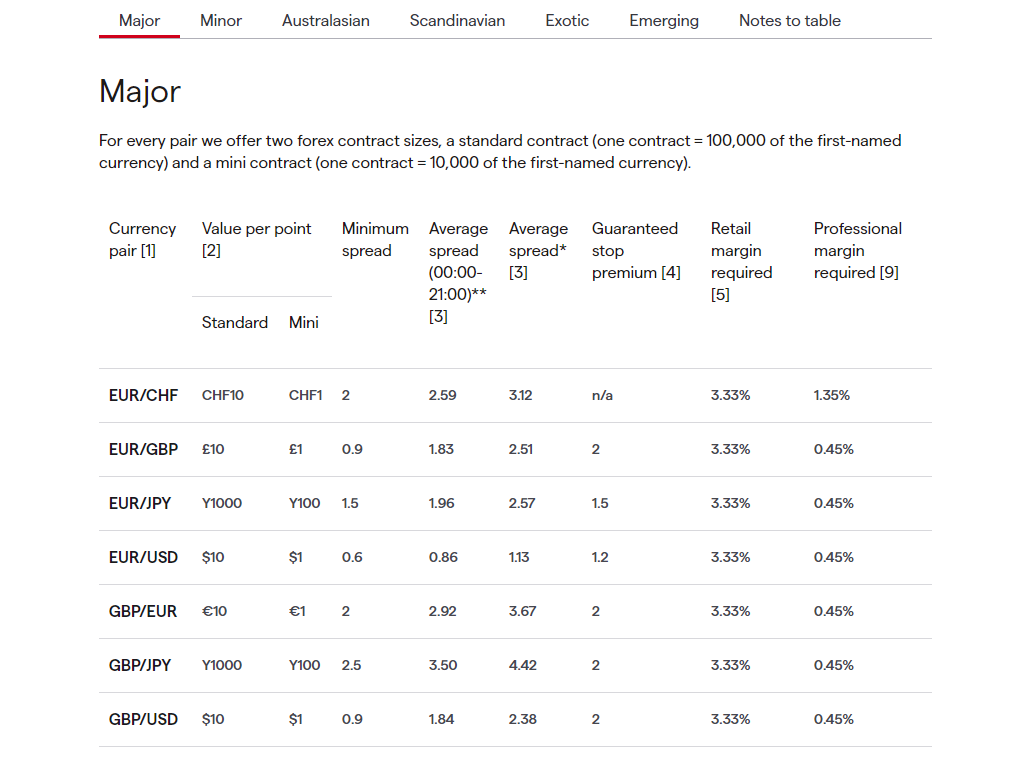
IG Markets also presents us with more information than AvaTrade did, but the figure we are interested in is the Average spread (00:00-21:00) for the EUR/USD.
We can see that the average spread on the EUR/USD for most of the trading day is 0.86 pips, not much of a difference with the 0.9 pips at AvaTrade. But we can also see that sometimes spreads are as low 0.6 pips, which is quite a gap. What we can say from this research is that both AvaTrade and IG Markets are good brokers with tight spreads.
When researching a broker, you want to make sure that they publish their spreads and that the spreads are low for the currency pairs you want to trade. If you find a broker that does not publish its spreads, or does not publish its spreads in detail, you should be instantly suspicious.
Brokers that do not publish their spreads often have something bad to hide and brokers with wide spreads are often just greedy.
Brokers with wide spreads or unpublished spreads are marked down in our reviews.
Commission
Another fee that brokers can charge is a commission per trade. Known as ECN brokers, these brokers provide direct market access and will have incredibly low spreads (sometimes as low as 0 pips). The commission varies between brokers, but the cost is usually between 4-7 USD per 100,000 USD traded.
Some brokers will offer both standard accounts (with no commission and a wider spread) and ECN accounts (with a commission and a tight spread).
A good example of this is Tickmill, let’s have a look at their account types:
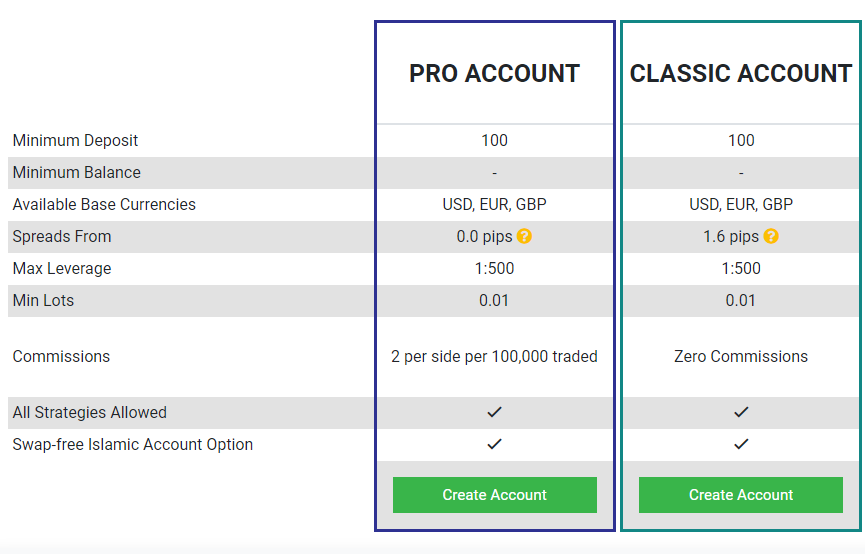
As you can see, the Tickmill Classic Account charges no commission, but spreads start at 1.6 pips. But the Pro Account has spreads starting from 0 pips (no difference between the buying price and selling price) but commission is charged at 2 USD per side per 100,000 traded (2 USD for opening the position and 2 USD for closing the position, so 4 USD in total).
If you decide to trade with an ECN account, you will want a low commission (like Tickmill’s above) and an average spread close to 0 pips.
ECN brokers who charge more than 7 USD total commission and have average spreads over 0.3 pips should be avoided and we mark them down in our reviews.
Rollover Fees
The rollover fee or swap rate is a small fee charged by brokers for holding a trading position overnight and is usually charged at 17:00 EST (New York time). This fee is based on the interbank interest rate for each currency in a currency pair. Sometimes these interest rates can work in your favour and you will gain interest on your position rather than be charged by the broker.
All brokers will charge rollover fees, they are an inescapable part of trading and can only be avoided by opening and closing your trades on the same day.
Deposit and Withdrawal Fees
The best brokers will charge no fees for deposits and withdrawals, and the worst brokers use them as major cash-making operations. Instead of charging a flat fee, some brokers will charge a percentage of the amount, which can get expensive if you are planning on making large deposits and withdrawals.
Most brokers will charge no fees for transactions via online payment systems like Skrill, Neteller or Ozow. Credit and debit card transactions are also often free, but bank wires will usually be charged by your bank for both deposits and withdrawals.
One of the best Forex brokers when it comes to deposits and withdrawals is FxPro. In the screenshot below you can see that FxPro charges no fees for deposits and withdrawals – though processing times vary depending on the method.
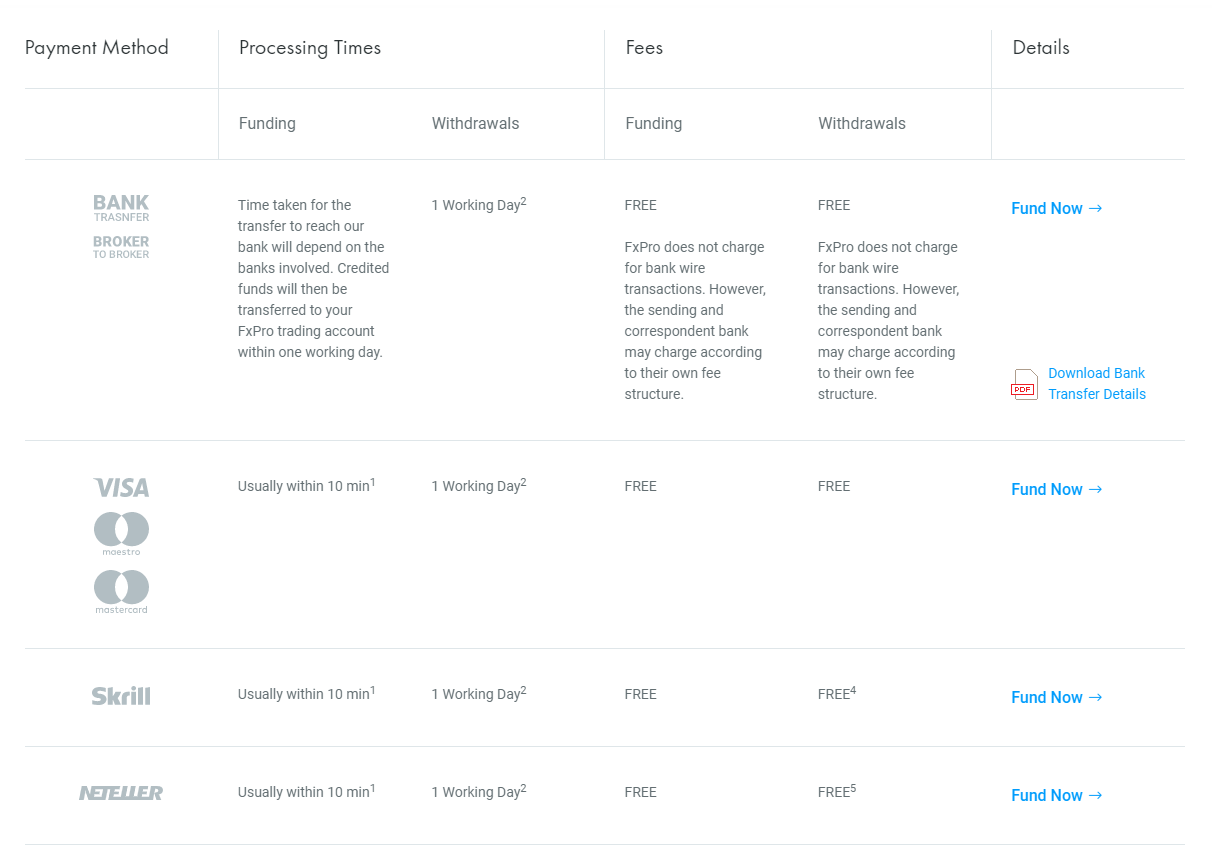
Beware of brokers who charge large amounts for withdrawals. The most infamous example is eToro, who used to charge 25 USD for every withdrawal. They have now reduced this to 5 USD per withdrawal, but this is still expensive compared to eToro’s competitors.
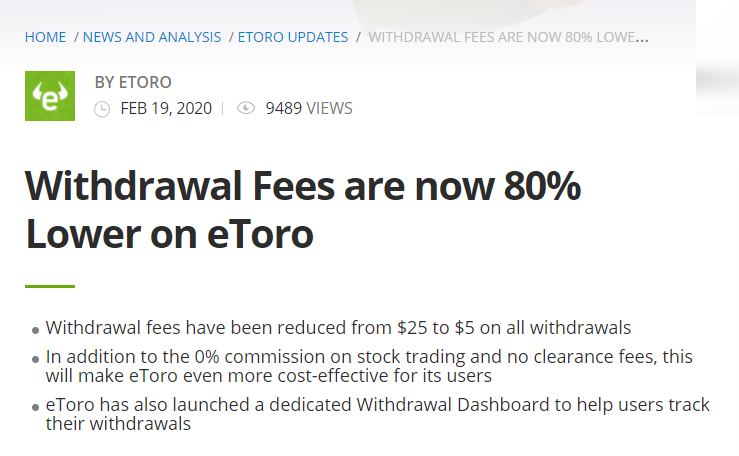
When you are looking for a new broker, always make sure to check the fees for deposits and withdrawals for your preferred payment method. Just because a broker charges fees does not mean that they are bad, but it is always something to be aware of.
Brokers that charge high fees or take a long time to process withdrawals are marked down in our reviews.
Minimum Deposit
Aside from the fees listed above, most brokers will also require a minimum deposit to open a live trading account. For some brokers this will be R70, for others, it may be R1500 or even R3000 where larger deposits unlock improved trading conditions.
A good example of this improvement in trading conditions with higher minimum deposits is the HotForex accounts structure:

As you can see, with each increase in minimum deposit there is some benefit. From Micro to Premium you have can have more simultaneous open orders. From Premium to Zero Spread you have a sharp drop in the spread and another increase in open orders.
What level of minimum deposit you are comfortable with is a very personal choice. But it is unfair for a beginner trader to be expected to part with large amounts of money to open an account when they are just starting out.
We do not mark down brokers for having accounts with higher minimum deposits, but we do think it is important for beginner traders to have an account that is not too expensive to open.
3. Trading Conditions: Not All Forex Brokers Are Created Equal
Apart from the spread, there are several other trading conditions which will affect your trading experience. One of the most important to consider is the leverage offered by a Forex broker.
Leverage is how much you can borrow from a broker to make a trade; this is a risky but necessary aspect of Forex trading. Leverage also directly affects the margin, or the amount of your own money you must risk when opening a trading position.
Other trading conditions to consider are the broker’s execution method and speed, the base currency of your trading account, what assets are available to trade and whether scalping and hedging are allowed.
Leverage: Risky Business
Leverage is money borrowed from your Forex broker to increase the size of a Forex trade. Leverage is essential in Forex trading because the movements of the market are too small to make a decent profit unless you place thousands of dollars on each trade.
Leverage is always presented in a ratio format, such as 30:1, 100:1, 300:1, etc. With 300:1 leverage if you put 10 USD of your own money into a trade you can borrow 300 times that amount and your actual trading position will be 3000 USD.
While this does mean you can make large profits with little investment, it also means that you can quickly lose more than your original investment.
You are still personally responsible for the full amount of your trade (all 3000 USD of it!) and if you cannot cover your losses, the broker will take any unused money in your trading account to do so. If this is still not enough to cover your losses, you may end up owing your Forex broker money, unless they offer negative balance protection.
In the example below, we can see the amount of leverage OctaFX offers changes depending on which account you have and which asset you are trading. Notice that cryptocurrencies have exceptionally low levels of leverage, this is because they are so volatile that the risk involved is extremely high for both the trader and the broker.
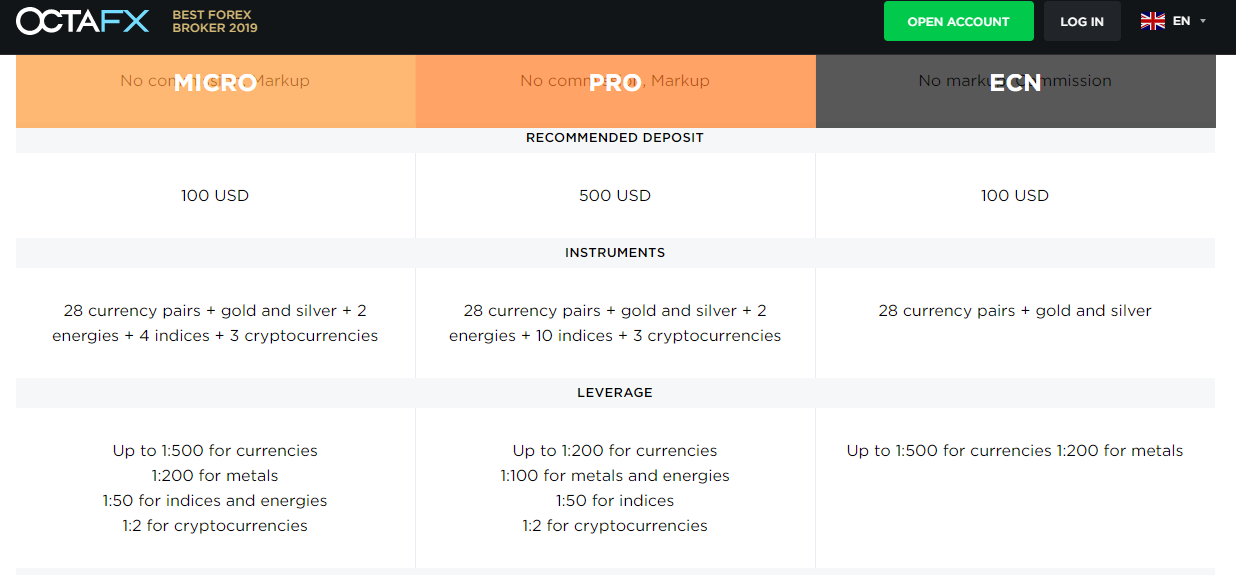
Because using high leverage significantly increases risk, some regulators like CySEC and the FCA now restrict leverage to 30:1 in Europe and the UK. Brokers in the EU and the UK are also required to offer negative balance protection.
In Kenya there are no restrictions on leverage and negative balance protection is not mandatory, so it is important to be careful. Always check with your broker that they provide negative balance protection before you start trading.
Maximum leverage varies among brokers. When you are thinking about signing up with a broker, you want to see that they offer enough leverage to make Forex trading profitable, but not so much that it is dangerous. If a beginner trader opens an account with 5 USD and 1000:1 leverage, it is likely they will lose all their money very quickly.
There is a fine line between sufficient and excessive leverage and the best brokers will restrict high leverage to experienced traders or those with larger account balances. A good example of this kind of responsible behaviour is Blackstone Futures, a South African Forex broker with a track record of supporting their traders. At Blackstone Futures, maximum leverage for new traders is 100:1, and will only be increased after a trader has a history of responsible trading.
Execution Speeds and Execution Methods: Market Makers vs ECN and STP
Execution speed is how fast a broker will place your trade and is often linked to execution method. Many brokers will offer instant execution, thus preventing changes in price while your trade order is processed (slippage) or the rejection and return of your trade order (requotes).
Brokers who offer instant execution are known as market maker brokers. When you trade with a market maker broker, they do not place your trade on the Forex market, but instead, act as counterparty to your trade. While there is a conflict of interest in this business model (because when a trader loses, the broker profits) market makers take their prices from the large banks and regulation prevents them from manipulating market data.
Brokers who offer market execution are either ECN (Electronic Communication Network) brokers or STP (Straight Through Processing) brokers. ECN brokers operate as a hub for a network of liquidity providers and will automatically find the best price for your trade from the members of their network. STP brokers have more control over which liquidity provider to use and generally have faster execution speeds. Some market execution brokers are hybrid ECN/STP brokers, though this is rare.
All types of market execution brokers can often suffer from both slippage and requotes, especially in times of high market volatility or low market volume. The best market execution brokers have invested in expensive infrastructure and have multiple liquidity providers to prevent this.
One such is broker is XM, an STP broker famous for its high-speed execution. XM never offers requotes, despite offering market execution only:
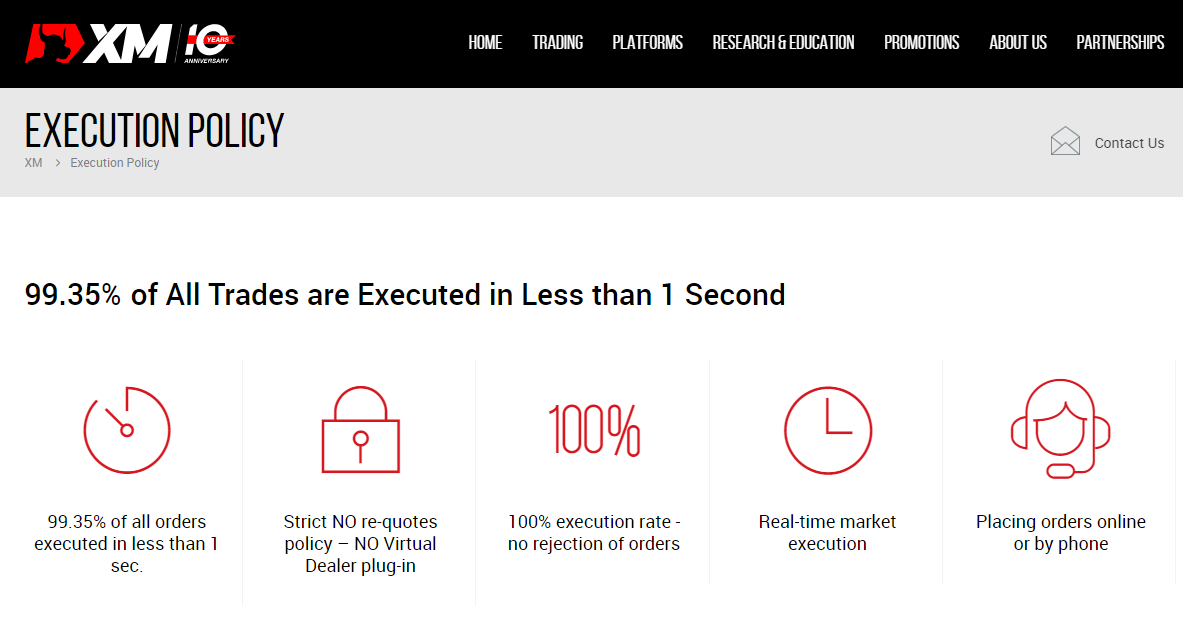
While we do not mark brokers down in our reviews for their execution method, we always mention it as many traders have a strong preference for either market execution or instant execution.
Base Currency: USD or KES?
The base currency, also called trading account currency, is the currency that your money in your trading account will be held in. The most common base currency is the US Dollar (USD). Many brokers will also offer Euro (EUR) or Pound Sterling (GBP) accounts too.
Some brokers have a wide range of base currency options. The Micro Account at IronFX has no less than 11 base currencies to choose from:
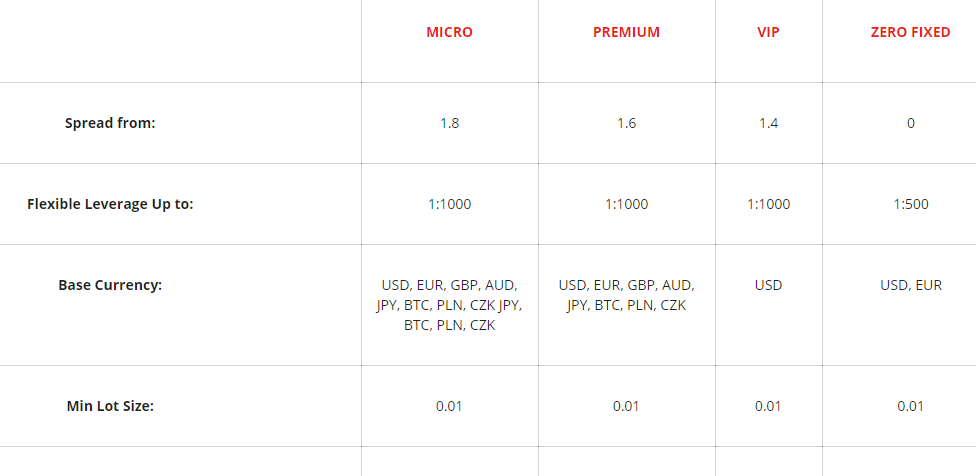
But in Kenya, one of the questions you should ask is whether a broker offers Kenyan shilling (KES) as a base currency.
The advantages of having KES as base currency in KES are:
- You will not have to pay any broker conversion fees when sending money from your local account
- You will not have to pay any conversion fees that your bank or credit card may charge when making a fund transfer or withdrawal
- Brokers with KES accounts usually use Kenyan bank accounts, so withdrawals and deposits are much faster and often happen instantly.
While we do not mark brokers down in our reviews for not having KES accounts, it is something we will highlight as we know how important it is for Kenyan traders.
Trading Assets: It is not always about Forex
In principle, the number of currency pairs you could trade is only limited by the number of currencies in the world. The reality is that most Forex brokers only offer a small portion of these. But it is important that a Forex broker offers you a real choice. A good Forex broker will offer at least 50 different Forex pairs to trade.
Many Forex brokers are also multi-asset brokers, especially the larger ones. This means that you can also trade other financial instruments such as cryptocurrencies, equities, commodities, precious metals, indices, and bonds.
We think that a good Forex broker should have 50+ Forex pairs to trade and those that have less will be marked down in our reviews. We also mark down brokers who do not offer at least a few other financial instruments to trade.
Hedging and Scalping
A Forex scalping strategy is where a trader seeks to profit from rapid price changes in a short period. Scalping opportunities are usually created when significant unexpected news events happen, or when the equity markets open. A scalper, a trader who employs a scalping strategy, enters and exit trades several times a day, and closes all trades on the day they were opened. Not all brokers allow scalping, but those that do must have fast execution.
Hedging is protecting yourself against adverse price movements that would affect open trades and is a form of insurance. Direct hedging is a common strategy, where a trader buys a currency pair and then sells the same pair at the same time. Not all brokers allow hedging on their platforms, but most market execution brokers do.
4. Customer Support
Having a Forex broker with great customer support is crucial. It is one of those things that you hope you never need; but when you do need it, it must be easily available, fast, and genuinely helpful. When your money is on the line, you need your problem fixed as soon as possible.
The best Forex customer support will be available 24 hours a day (Monday-Friday) via live chat, telephone, messaging services and email. It is also important that a broker has great IT support, as setting up a trading platform can be tricky for new traders. Many new traders cannot find the time during the workweek to get set up, so weekend support can be invaluable but is rare.
Kenyan traders also value having local customer support – not least because some local customer support teams can assist in Swahili.
Aside from local customer support, we also highly rate brokers that offer 24-hour support and weekend support.
5. Platform Choice
Brokers will always offer you a trading platform to access the Forex market. Some brokers have their own software, but many use programs like MT4, MT5 or cTrader that you can download to your computer or mobile phone.
One of the brokers with the widest range of platforms is IC Markets, which offers MT4, MT5 and cTrader across all devices:
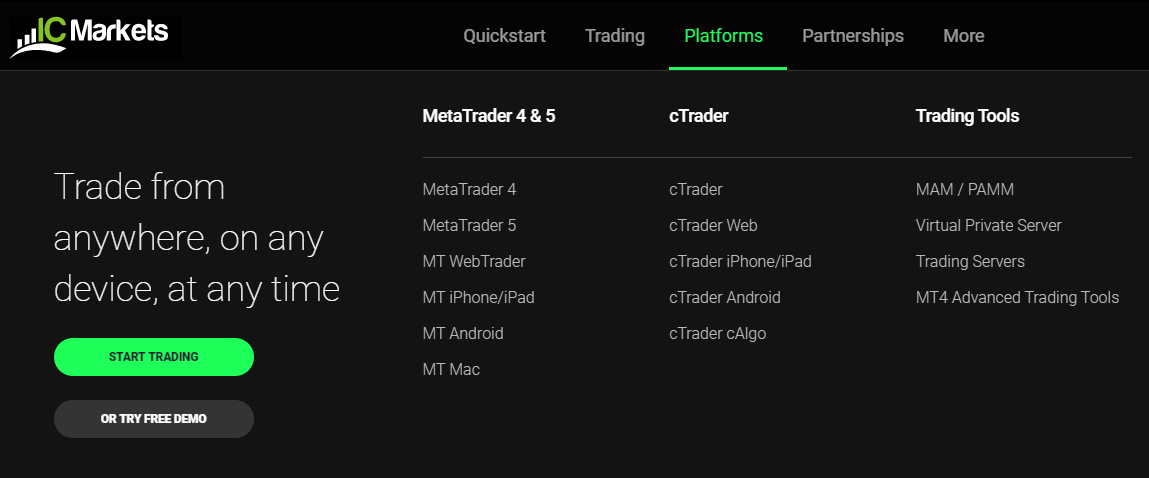
MetaTrader 4 is the most common Forex trading platforms however, its older interface and complex setup make it less accessible to beginners. MetaTrader 5 and cTrader, on the other hand, have a more modern interface and are easier for beginner traders to set up.
If you are an experienced trader with a particular software choice in mind, or if you are a beginner seeking to learn more about platform options, we have put together a list of the best Forex trading platforms for traders and the brokers that support them.
All brokers have mobile trading apps, and some will have developed proprietary apps, but a vast majority rely on the MetaTrader app for IOS and Android.
We know that Forex traders value choice and when we judge brokers, those with a full range of platforms will be rated higher in our reviews.
6. Other Things to Consider
So, we have looked at Regulation, Fees, Trading Conditions, Customer Support and Platform Choice – but there are a few other things to think about when choosing a broker.
- Brokers for Beginners: Some brokers are better than others for beginners. The best brokers for beginners will have clear and practical educational material, insightful market analysis and top-notch customer support. Some brokers will also offer one-on-one training, live webinars and real-world seminars.
- Demo Accounts: It is important for beginner Forex traders to also have a demo account that will not expire, so you can be completely comfortable with the market and the trading platform before you start trading with your own money.
- Swap-Free (Islamic) Accounts: Islamic accounts, or swap-free accounts, are an optional trading account type which allows Forex traders to be compliant with the principles of Sharia law. In Sharia law interest is prohibited, so swap-free accounts do not pay or earn overnight interest (rollover fees) on open positions.
- Managed Accounts: Some brokers will operate a managed account for you, but this is rare. There are independent money managers who can manage your account while they are trading for themselves. It is vital that you read our article on managed accounts and understand the minimum deposit requirements and additional risks involved when trading CFDs.
FAQs
What is the best Forex broker in Kenya?
The best brokers in Kenya are AvaTrade, FXTM and XM. AvaTrade is a great all-round broker with low fees and tight spreads. FXTM is trusted by thousands of traders across Africa and has a great range of account types. XM is the best overall broker, with great customer support and education for new traders.
I am a beginner trader, what should I look for in a broker?
As a beginner trader, choose a broker with an unlimited demo account, as this will give you the opportunity to practice before making a deposit. Limited demo accounts usually expire after 1-3 weeks, which is not enough time to learn how to profit from CFD trading.
Beginner traders should get educational support when starting, and each broker varies significantly in what material they provide. The minimum you should accept is some general videos and articles, but some brokers have invested in creating small trading universities that include video material as well as live webinars hosted by experts.
Each of our reviews has a section on the educational content to help beginner traders decide the best path forward.
Which is the best Forex brokers for beginners?
The Forex broker for beginners is XTB. Customer service is available 24/7 with both one-on-one mentoring and dedicated account managers provided for new traders. Educational material is excellent and is presented via XTB’s Trading Academy, which is both well-structured and clear. Finally, minimum deposit requirements are low, and spreads are tight.
How do you trade Forex in Kenya?
To trade Forex in Kenya you will need a trustworthy Forex broker, which you can find here at TradeForexSA. Before you start trading, you should open a demo account with the broker so you can gain experience with the Forex market and with the broker’s trading platform. Once you have gained enough experience you will need to deposit funds with the broker via bank transfer or a payment system like Ozow or Neteller. Once your live account is funded, you will be able to start trading.
Is Forex trading legal in Kenya?
Yes, Forex trading is legal in Kenya and you can trade with any Forex broker in the world.
How do I know I can trust a Forex broker?
Four things should be considered when determining if a broker may be trusted – regulation, trade execution method, client funds management, and industry recognition of their achievements.
The more major regulators the broker group is regulated by, the more oversight the group has. The number of regulators overseeing their processes gives a strong indication of the level of trust the government regulatory agencies have in them.
The execution method of trades is another component because if the broker profits from your loss – as is the case with market maker brokers – this can be seen as making the broker less trustworthy.
This is more of a concern if fewer major regulators regulate a market maker. Therefore, a heavily regulated market maker is considered more reputable than one with lesser regulation. It is noteworthy that some market makers have strong reputations and lots of client resources.
Most regulators require strict processes to keep client funds safe. This process includes placing client funds in segregated accounts at major banks in the local jurisdiction. Segregated bank accounts that are audited every evening means that client funds are protected against any bankruptcy.
Industry awards are given to brokers from journalists, financial watchdog organisations and their peers. While it can be argued that these award ceremonies are biased, they remain the best gauge industry recognition.
Do brokers trade against you?
If the broker is a market maker, then they are the market and will be trading against you by being the counterparty to your trade to create the liquidity you need. Since a vast majority of trades by retail traders are lost, a market maker is making money in most client trades. DMA brokers do not have any conflict of interest and do not trade against you.
How do brokers make money?
Market Makers will make money only from the spread – the difference between the buying and selling price of the currency pair. Since a Market Maker will become the counterparty to any trade, they will also make money when clients lose trades.
DMA brokers will make money from a tight spread and a commission, which is calculated on a per lot amount.
How to deposit with a broker?
Each broker is going to have different deposit methods, but all will have a deposit by credit/debit card and bank transfer option. Most brokers will also accept Neteller or Skrill, which are favoured by many traders because deposits and withdrawals are instant and usually free.
Some will accept regional payment methods, but local deposit methods have not yet been adopted in Kenya. On occasion, brokers will accept Bitcoin deposits, and PayPal in addition to standard currency.
Which broker should I choose?
Traders have different requirements of Forex brokers, and thus there is no single best choice. This is how we compare them, and we offer insight into your choices. At the top of this article, there is a list of those that we believe are the best brokers for traders based on their reputation, platform, trading conditions and resources available to beginners.
How can I report scam brokers?
If you believe you have been scammed by your broker, the first thing to do is warn others and tell your story. We have a report a scam broker form which we use to gather information so that we get the word out. If you have been scammed, please complete the form.
Forex Risk Disclaimer
Trading Forex and CFDs is not suitable for all investors as it carries a high degree of risk to your capital: 75-90% of retail investors lose money trading these products.
Forex and CFD transactions involve high risk due to the following factors: Over-leveraging, unpredictable market volatility, slippage arising from a lack of liquidity, inadequate trading knowledge or experience, and a lack of regulatory protection for clients.
Traders should not deposit any money that is not disposable. Regardless of how much research you have done, or how confident you are in your trade, there is always a substantial risk of loss. (Learn more from the FCA or from ASIC)
Our Rating & Review Methodology
Our State of the Market Report and Broker Directory are the result of extensive research on over 180 Forex brokers. The explicit goal of these resources is to help traders find the best Forex brokers – and steer them away from the worst ones – with the benefit of accurate and up-to-date information.
With over 200 data points on each broker and over 3000 hours of research and review writing, we believe we have succeeded in our goal.
In a world where trading conditions and customer support can vary based on where you live, our broker reviews focus on the local trader and give you information about these brokers from your perspective.
All research has been conducted by our in-house team of researchers and writers, gathering information from various company representatives, websites and by sifting through the fine print. Learn more about how we rank brokers.


































